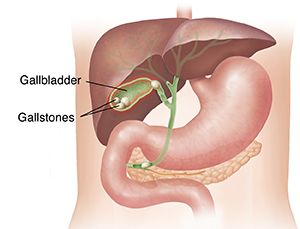The gallbladder is an organ that stores bile until it's needed for digestion. Bile is a substance that helps break down fats. Deposits in bile can clump together, creating hard, pebble-like stones (gallstones). In most cases, gallstones don't cause any symptoms. Sometimes they irritate the walls of the gallbladder. Or they can block flow of bile out of the gallbladder. If the stones fall into the common bile duct, stones can block the flow of bile into the small bowel. This can lead to yellowing of the eyes and skin (jaundice), pain, or serious infection. Stones are treated only if you have symptoms. If treatment is needed, your healthcare provider will discuss your choices with you. The most common treatments are listed below.
Medicine
Your healthcare provider may prescribe medicines that contain bile acids to dissolve small gallstones. You may need to take them for a long time to break up all the stones. Once you stop the medicine, the gallstones may build up again.
ERCP
Endoscopic retrograde cholangiopancreatography (ERCP) is an outpatient procedure to remove stones. After you're given medicine to help you relax, the provider passes a thin tube with a camera (endoscope) through your mouth, esophagus, and stomach to the first part of the small intestine (duodenum). They use video and X-rays to locate stones blocking the flow of bile. They then remove the stones from the bile or pancreatic ducts. ERCP may be done alone or before surgery to remove the gallbladder.
Surgery
A cholecystectomy is an operation to remove the gallbladder and its contents (gallstones). Today, most of these procedures are done laparoscopically. This means using several very small cuts in the belly (abdominal incisions) and passing a camera and surgical instruments through the incisions. Cholecystectomy may also be done with traditional surgery, using one larger incision. Your provider will talk with you about which method is best for you.
Prevent future symptoms
After treatment, follow the diet given to you by your healthcare provider. This diet includes lean meats, lean poultry, and fish. Stay away from full-fat dairy products. Eat foods high in fiber, such as fruits, vegetables, and whole grains. Also eat healthy fats, such as those found in fish and olive oil. Don't eat unhealthy fats, such as those found in desserts and fried foods. Also don't eat refined carbohydrates or sugar. Stay at a healthy weight and get regular physical activity.


